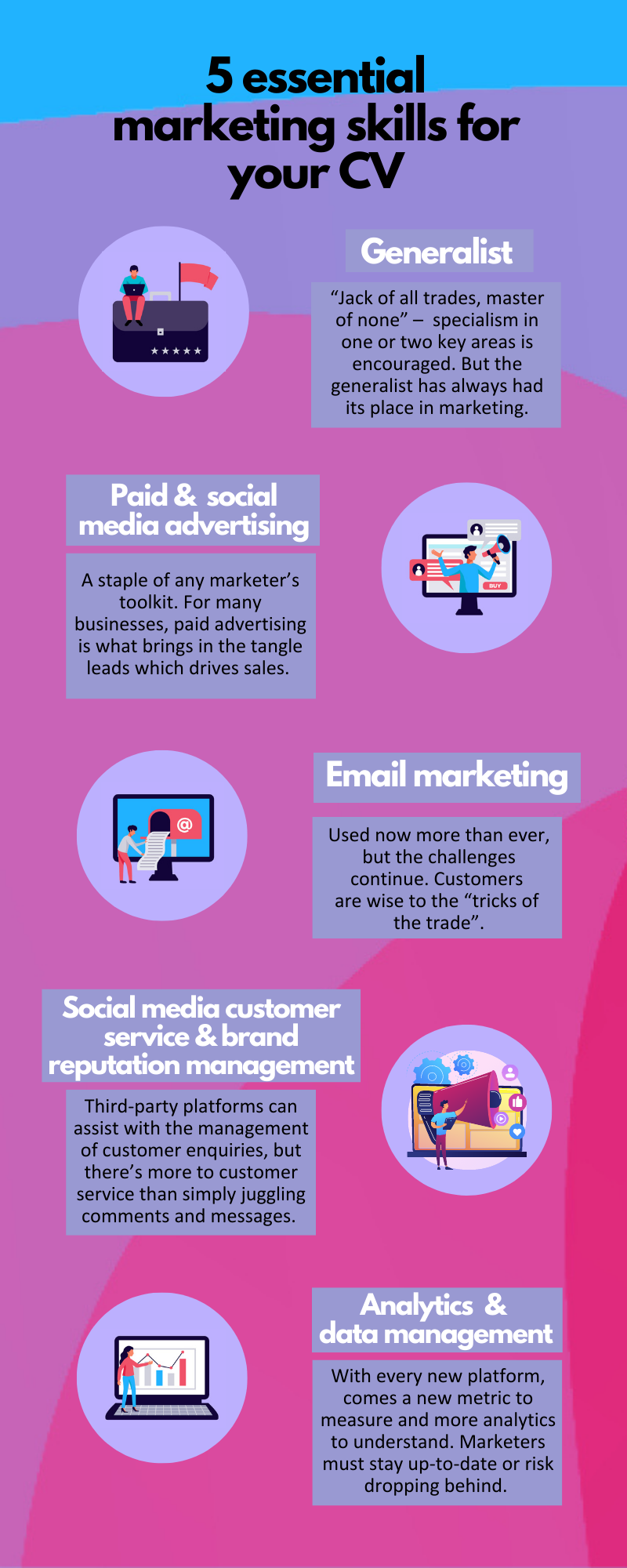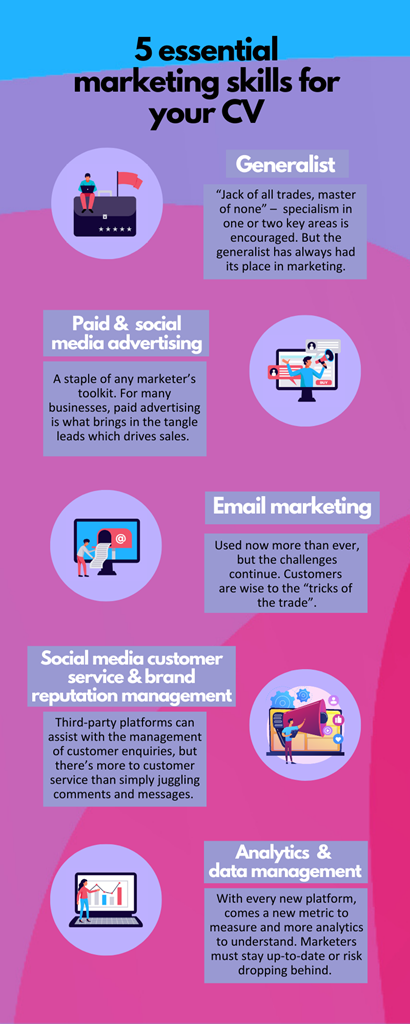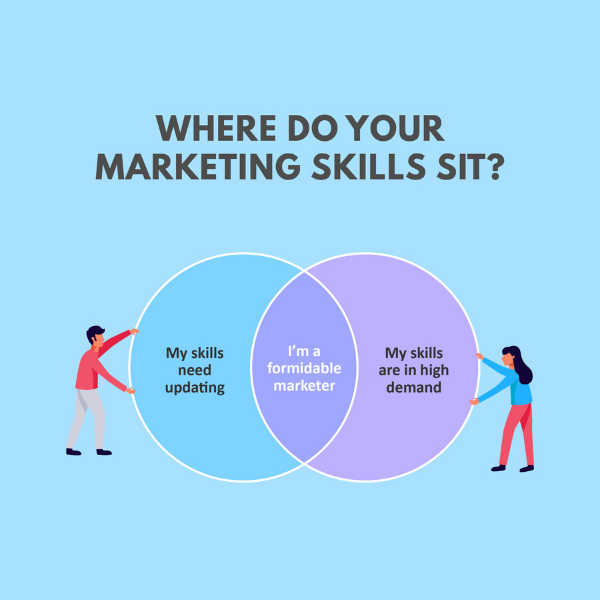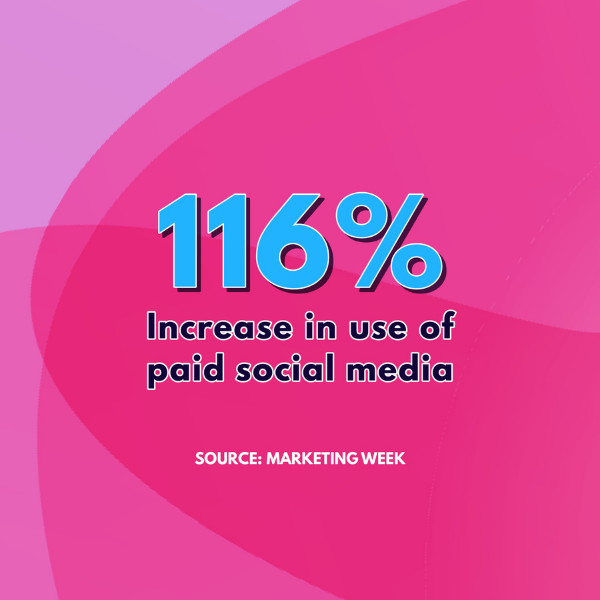Essential marketing skills you need on your CV

- 24 May 2022
Marketing is a thriving industry. Over the past 30 years, it has had to keep up with technological innovations the same way that specialists have to constantly hone their marketing skills. Recent challenges have forced marketers to adapt to a new landscape as customer expectations and requirements shifted. So, how has this impacted the skills required to succeed in your marketing career?
For those currently working in marketing, or those considering a career in the sector, you’re probably wondering what key skills will take you furthest on your journey. After all, “marketing” is a very broad term and contains multiple specialisms, each requiring specific training and experience to reach a professional level.
The Chartered Institute of Marketing (CIM) defines marketing as: “The management process responsible for identifying, anticipating and satisfying customer requirements profitably.”
As a natural extension to this, marketing is also about using various skills and tactics to achieve the above.
Modern marketing is a very different world from that of just a few years ago, with digital strategies playing a significant role and traditional methods often becoming less relevant and less effective. This means that while certain skills associated with the field (such as creativity and communication), are certainly still important and applicable, there are a whole host of other, newer skills that employers are now looking for in their marketing hires.
Skills shortages vs skills demand
We took a deep dive into CIM’s 2021 Digital Marketing Skills Benchmark, one of the definitive and impartial sources of skills gaps across the industry. The report aims to inform the conversation and drive an ongoing skills improvement agenda.
According to the data, overall marketing recruitment is reporting a notable increase in demand for mid and senior-level professionals such as managers and executives.
When it comes to the learning of new skills, the biggest drop in skill knowledge was at entry-level. This is perhaps due to limited access to training, support, and development for junior team members while working remotely. The “entry-level-plus” demographic of marketing executives also experienced skills gaps due to similar reasons.
Finally, we see a stagnation of skills once people achieve management level roles, meaning those responsible for managing teams and agencies are not investing time into their learning and development.
Now that the world is beginning to re-settle following a turbulent few years, we’re now in our “new normal”. At the same time, the industry has largely completed its digital transformation and, as a result, “marketing” and “digital marketing” are now often used interchangeably.
So what skills are essential for 2022’s marketer?
Generalist
“Jack of all trades, master of none” – a phrase often designed to encourage specialism in one or two key areas. But the generalist has always had its place in the marketing world, and that hasn’t changed.
Looking at CIM’s Digital Skills Benchmark, all disciplines have seen a dip, stayed static or seen a very small increase, with the exception of general marketing, which has improved significantly with a 7% uplift, since the last report in 2020.
General marketing covers all industry fundamentals and models, and is often an area for managers, heads of department or director level roles. Having an awareness of “all things marketing” is certainly a strength for those overseeing a marketing function or team. As senior professionals become more “hands off” with the day-to-day activity, instead focusing on the overall strategy and tactics, a lack of specialist knowledge is inevitable.
The past few years’ challenges have compounded this issue. A wave of (often overnight) furloughs and redundancies at lower levels undoubtedly resulted in the more senior roles having to wear more hats and take on more of the day-to-day tasks.
With a lack of investment in training across the globe, there seems to have been a shift into ensuring the “basics” are covered, and a “back to fundamentals” approach, or reliance on previously learnt techniques.
Whether they are the lone marketer in a business who wears as many hats as possible, or whether they’re looking to keep their knowledge diverse to future-proof their position as team leader, there’s always been, and always will be, a role for the general marketer – making it the number one skill for all marketers to master.
Paid & social media advertising
Paid advertising is a staple of any marketer’s toolkit. Organic website traffic and brand awareness has always been valuable, but for most companies, you can’t beat throwing a budget behind an advert and watching it thrive in front of customers’ search results and social media feeds. For many businesses, paid advertising is what brings in the tangle of leads which leads to sales.
According to results back in February 2021, the demand for social media ads has increased by 45.9% within the past 12 months, with the use of paid social media rising by 116.4%.
In CIM’s Digital Skills Benchmark, Pay-Per-Click (PPC) saw a very small 1% improvement. In a report which shows dips for most skills, this is significant.
In the past few years, customers’ attention has shifted even more away from shop windows and billboards towards the internet and social media feeds. And as any marketer will know – if you want to survive (never mind thrive), you need to go where your customer goes.
And so the legions of marketers doubled down on their paid advertising to hit their targets. This inevitably created an even noisier battleground in an already deafening space.
Therefore, the brands that excelled (and continue to excel) in the paid advertising and social media space, are the ones that really know their platforms – which is why paid and social media advertising is number two on our list. 
Email marketing
In the Digital Skills Benchmark, email marketing saw a small 1% improvement. Believe it or not, we’re now more than four decades into the world of email marketing, making it a skill that almost all marketers have been exposed to during their careers. A key part of the generalist toolkit, it’s not surprising that it saw an uplift in use during the past two years.
However, the report notes: “A high level of comfort with Email Marketing is great, but historical data tells us that just because people understand a channel, doesn’t mean they always apply their knowledge to deliver best practice activity. Comfort with email also means it is easier than ever to send email campaigns, creating even more noise in an already noisy space.”
Like social media, email marketing is used now more than ever. But the challenges continue to mount up – customers are wise to the “tricks of the trade” – it’s no longer enough to personalise a subject line or click-bait FOMO message.
On top of that, stricter GDPR regulations, smarter spam filters, and a general apathetic complacency towards anything that lands in your inbox has resulted in email marketing being tougher than ever.
The brands that will continue to thrive with email as a key marketing channel, are the ones who are able to employ the skills they utilise elsewhere. They will make use of all the marketing fundamentals and employ best practice to create engaging journeys and nurture campaigns, coupled with precisely-targeted sales activity.
Social media customer service & brand reputation management
As we’ve discussed, the past couple of years have seen customers flock to social media in their downtime. On top of that, the physical inability to engage with brands in-person has resulted in even more social media interaction between business and consumer.
“With an increased pressure to retain customer engagement, keep brands front of mind and alter products and services to meet a world in lockdown.” Gemma Butler, marketing director, CIM.
As well as direct messages from existing or potential customers, a social media team has to juggle engagement on organic and promoted content, sometimes across a dozen or more platforms.
A quick look on a brand’s Facebook page will tell a customer how effective their customer engagement is, with the cream of the crop being classed as “very responsive” to messages.
Various third-party platforms can assist with the management of customer enquiries, but there’s more to customer service than simply juggling comments and messages.
The ability to quickly and effectively resolve queries requires marketers to maintain a detailed knowledge of its brand’s products or services and remain in constant communication with other departments, from sales to operations. Another essential is for a social media team to be 100% aware and invested in their company’s key messages and values, to ensure that they are representing the brand in the correct way.
Communication has always been an essential marketing skill, but it’s vital now more than ever.
Analytics & data management
In CIM’s Benchmark, analytics & data has seen the largest decline in skills, with a drop of 6%.
With every new platform, comes a new metric to measure and more analytics to understand. On top of new technologies, changes to existing platforms - such as Google Analytics 4, new cookie rules, and Facebook’s transformation into Meta – means that marketers must stay up-to-date or risk dropping behind.
Covid-19 will have undoubtedly resulted in some marketers narrowing their focus onto the essentials (such as cost-per-lead), rather than the more “luxury” analytics.
This drop is of concern for CIM, who believe it is “worrying for the ability of marketers to analyse and constantly improve their work. These are possibly the most worrying results within the benchmark, due to the impact poor analytics skills and poor usability can have on all aspects of digital marketing. Bear in mind that topics like personas and user journey mapping fall into Usability, meaning that these key principles will be within this low skill level.”

If you’re looking to kickstart your marketing career, visit our Get into Marketing page and The B2W group for more information on the various routes you can take into marketing, including apprenticeships, and how they can help develop your marketing skills.

- 0 views

 FAQs
FAQs
 Log in
Log in
 MyCIM
MyCIM








